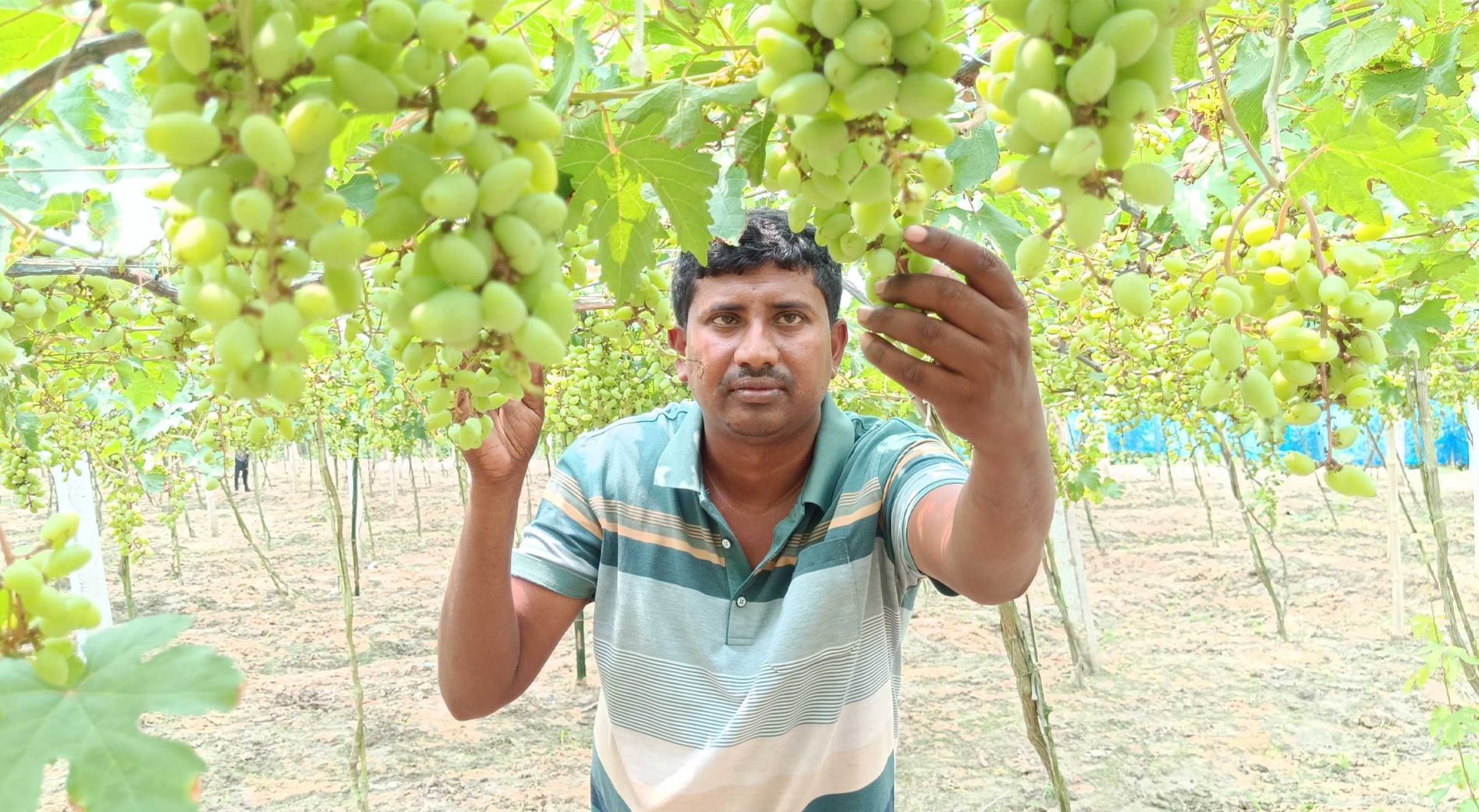
Md. Morshed Alam: Commercial grape cultivation has already started in Jibannagar, Chuadanga, Bangladesh. The interested Agricultural entrepreneurs are getting success in cultivating the foreign Baikunur variety of grapes. The plants start to fully flower and bear fruit one year after planting. This year, grapes have been cultivated on 35 bighas of land in this upazila. Entrepreneurs are expecting approximately 300 maunds (around 11,000 kg or 24,000 lbs) of grapes from this land this season, with an estimated market value of around 3 million Bangladeshi Taka.
Visiting the vineyards, A person can easily see the bunches of grapes hanging from the vines. Bamboo poles and trellises have been set up to support the weight of the grapes. Besides,Nets have been placed over the plants to protect the ripe grapes from birds and other animals. Agricultural entrepreneurs in Jibannagar upazila have found success and made the seemingly impossible possible.Evey now and then,
People from different places are visiting these grape gardens. This fruit, known for its sweetness and nutritional value, has high demand in the domestic market. Currently, Bangladesh relies on imports to meet its grape demand. Expanding grape cultivation across the country could reduce this import dependence.
It is reported that Ruhul Amin Riton, a young agricultural entrepreneur from Pearatala village in Jibannagar, Chuadanga, initially started experimental grape cultivation on a little scale in 2019. However, the grape yield was not so good. Agricultural entrepreneurs did not find success even after changing grape varieties. Finally, they achieved success by cultivating the Baikunur variety. Following this, several farmers in different villages of the upazila established small and large-scale grape orchards for commercial cultivation.
In 2024, the grape orchards blossomed and bore fruit, raising the hopes of the orchard owners that grape cultivation would be successful in the local climate and soil. This year, all the grape orchards have produced abundant flowers, which have turned into fruit. Bunches of fruit hang throughout the gardens. Orchard owners have planted several foreign varieties of grapes. This year, the Baikunur grapevines in the orchards started to bloom in early March. The flowers turned into fruit within 20-25 days, and the grapes will start to ripen within another 20-30 days.
Farmers are showing interest in grape cultivation as it is easy and profitable. Regular maintenance involves fertilizers, pesticides, and irrigation. Two hundred grape saplings can be planted per bigha of land.
Grape farmer Ashraful Islam told that he had a childhood passion for planting grapevines. Every time he bought saplings from the market, the plants would grow but not bear fruit. For several years, he collected saplings from different parts of the country and planted them, but without success. In early 2024, he planted 800 saplings of the Baikunur variety on three and a half bighas of land in Hasadah village. Some plants died. Five months after planting, a small number of fruits appeared, and these ripe fruits were sweet.
He further said, “This year, the orchard has yielded a full harvest, which we could hardly believe at first. Each plant has borne 15-20 kg of fruit. Regular maintenance is required. There is a huge demand for grapes in the market. Approximately 300 maunds of grapes will be produced from 35 bighas of land this season, with a market value of about 3 million Taka.”
Saddam Hossain from Raipur village in Jibannagar said that he has a seven-bigha grape orchard with a significant yield. He believes that grape cultivation is easy and profitable, with relatively low costs, and that it is possible to expand grape cultivation across the country. He also mentioned that farmers in this upazila have found success in cultivating various foreign fruits.
Md. Alamgir Hossain, the Agriculture Officer of Jibannagar Upazila, stated that although farmers had been cultivating grapes for several years, they were not getting good yields. He believes that success will come with sweet, seedless varieties, after which various initiatives will be taken to expand cultivation nationwide. He mentioned that all kinds of support will be given to grape farmers and noted that the yield is very high this year, which will be very profitable for the farmers even if sold at 200 Taka per kg.





